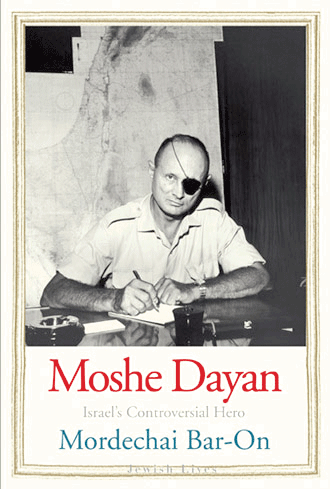Reviewed by NEAL GENDLER
Retrieving Moshe Dayan from an increasingly distant past, Mordechai Bar-On’s biography provides a good overview — and a few surprises.
Dayan, a legend in his own time after the 1956 Sinai campaign, may have attained his greatest success two decades later, sensing that Egypt’s Anwar Sadat was ready for peace and working to bring him to Israel.
Bar-On, senior research fellow at Yad Izhak Ben-Zvi Institute in Jerusalem, was Dayan’s bureau chief during Sinai and, “like so many others, was captivated by his charm.”
The book, latest in the Jewish Lives series, is readable and nicely indexed but oddly has only two photos and no maps.
Bar-On calls Dayan’s story that of Israel as it “evolved from an aspiration to an accomplishment.” Born on Kibbutz Deganya, Dayan grew up on Moshav Nahalal, doing much of the family’s farm work. Often associating with Arabs, Dayan had a “lifelong ambivalence,” empathizing with them but determined “to repulse their attempts to thwart the Zionist cause.”
He joined the Haganah as a teen. Later a favorite of Prime Minister David Ben-Gurion, he was made commander of the Jerusalem district in 1948 and chief of staff in 1953. Dayan’s philosophy was, “There is no need for provocation, but if battle ensues, we must not lose.”

Provocation arose in 1955, with Egypt’s big Czech arms deal. That, and fedayeen raids into Israel, led to plotting with Britain and France to launch the 1956 war — Israel capturing the Sinai, and Britain and France aiming to seize the newly nationalized Suez Canal. Bar-On says his notes are the only written record of the meetings planning the campaign, a military success but a political failure, with the United States forcing relinquishment of all gains.
Dayan retired from the Israel Defense Forces in 1958. He served as agriculture minister from 1959 to 1964, and completed the National Water Carrier, which made the northern Negev fruitful.
In Israel’s 1967 triumph, Dayan, the hastily appointed defense minister, was mostly an observer and morale booster as the IDF executed operations planned without him. Mid-war, he reversed his opposition to capturing the Golan, ordering it taken — before telling Chief of Staff Yitzhak Rabin or Prime Minister Levi Eshkol.
Dayan wanted to stop short of the canal, and later wanted to retreat from it to enable reopening. Bar-On says Israel’s canal outposts were built as shelters from Egypt’s artillery, not to repel invasion. When attacked, they were isolated and overrun.
Under public pressure and exhausted, Dayan resigned and retired in 1974 — “at peace with himself” — working on writing and archeology. In 1977, Prime Minister Menachem Begin appointed Dayan, a lifelong Laborite, foreign minister. Dayan called the later Camp David Accords “one of the greatest moments of my life.”
Bar-On doesn’t skirt Dayan’s well-known womanizing, including his years-long romance with Rachel Rabinovich — his second wife — while still married to Ruth. Calling him an “archeological miscreant,” Bar-On also addresses Dayan’s questionable possession of archeological antiquities.
The biggest surprise is quoting Naphtali Lavie, who called U.S. Vice President Walter Mondale’s contributions during the Camp David negotiations “most unfavorable,” with “snide remarks” so angering Dayan that he subsequently ignored him. I wanted to ask Mondale about this uncharacteristic characterization, but he couldn’t be reached in time for this edition.
Dayan was “a complex personality with an inquisitive mind, a man who sought solitude and reflection in order to conceive practical solutions to intricate problems,” Bar-On says. But “insensitivity to historical undercurrents and his inability to see the large picture” led to his military and political decline.
Dayan, weakened by a 1968 cave-in at an archeological site, was weakened further by colon cancer surgery and left government in October 1979. He died in 1981, at only 66 years of age.
***
Neal Gendler is a Minneapolis writer and editor.
(American Jewish World, 8.3.12)



















